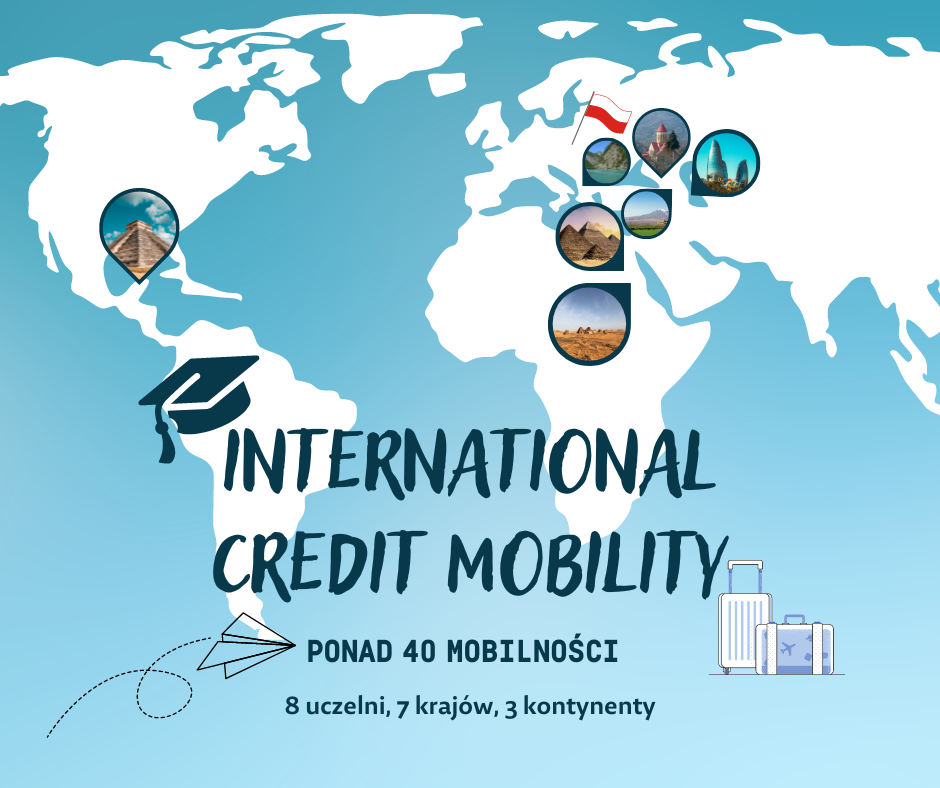Our University received funding for the implementation of activities under the Erasmus+ program „Mobility of students and university staff between program countries and countries not associated with the program” (KA171). The application prepared by International Cooperation Department in a cooperation with representatives of the faculties received a very high rating.
– The planned mobility program is essential for internationalization strategy of Polish University and developing of its teaching and research potential – summed up the expert evaluating the application.
The project includes academic staff mobilities and the arrival of students to UKSW. The project will last 3 years and will involve 8 universities from 7 different countries from 3 continents. We have received funding for more than 40 mobilities.
– In recent months the UKSW International Cooperation Department has obtained funding to proceed with projects from the NAWA and Erasmus+ programs. This is a very good result, which proves the intensive international development of our University. Ahead of us is a time of intensive work on the UKSW’s participation in the largest EU research program, Horizon Europe, which determines a long-term strategy for the implementation of international projects – saysRev. Professor Marek Stokłosa, PhD, Vice-Rector for Research and International Cooperation.
Three faculties of UKSW will participate in the KA171 project – the Faculty of Social and Economic Sciences (the Institute of Political and Administration Sciences), the Faculty of History and the Faculty of Biology and Environmental Sciences.
The Institute of Political and Administration Sciences from the Faculty of Social and Economics will cooperate with the University of New York in Tirana – the first private university in Albania, and two universities from the Caucasus region – Sokhumi State University in Georgia and Western Caspian University in Azerbaijan. The Caucasian region, which is an ethnic mosaic, is of particular interest to political scientists who hope to exchange ideas about current problems in the field of security and international relations, such as de facto regimes and contribution to peaceful settlement of conflicts.
The cooperation with the Albanian University will result in the exchange of knowledge on political changes and the integration of Western Balkans into the European Union. „Implementation of the project at each local, regional, national and international level will contribute to the recognition of both universities and increase experience in the implementation of international projects” – concluded the expert.
The Faculty of History will cooperate in the field of archaeology and art history with Cairo University from Egypt and University of Khartoum, the oldest and the largest University in Sudan. The subject of the exchange will mainly concern the culture of the Christian period of the historical land of Nubia. The areas of cooperation will also include the museological aspect. Archaeologists from Sudan and Egypt will see monuments of Nubian, Coptic and Ethiopian art in Warsaw and will learn how they are stored and exhibited. The effect of the exchange will be widening the knowledge on the influence of the Pharaonic Egypt on the development of Coptic and Nubian iconography.
“It should be emphasised that the cooperation is based on a common research topic, which is extremely important from the point of view of students, employees and institutions. The shared research topic is also a guarantee of long-term and stable cooperation” the expert noted.
The Faculty of Biology and Environmental Sciences will cooperate with the Mexican University in Yucatan – El Colegio de la Frontera Sur as well as Yerevan State University from Armenia and Ilia State University from Georgia. Cooperation with universities from Georgia and Armenia will be focused on the flora and fauna of the Caucasus and the assessment of the impact of the economy on the natural environment.
The main subject matter of the exchange is the impact of economic investments on the natural environment in Poland and Mexico. The correct assessment of ecological costs of planned economic projects is a priority task of environmental biology. “The area of cooperation is the exchange of experience and methodological skills in the field of assessing the effects of the economy’s impact on the natural environment and analyzing biodiversity. In the context of climate change, the subject of the project is extremely important.” – concluded the expert.


 04 September 2023
04 September 2023








